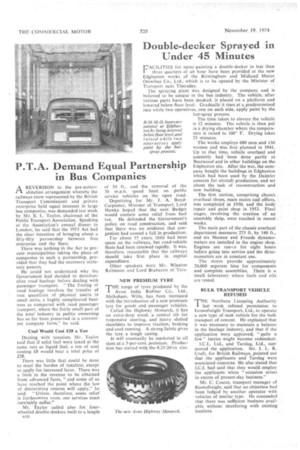Double-decker Sprayed in Under 45 Minutes
Page 44

If you've noticed an error in this article please click here to report it so we can fix it.
FACILITIES for spray-painting a double-decker in less than three quarters of an hour have been provided at the new Edgbaston works of the Birmingham and Midland Motor Omnibus Co., Ltd., which is to be opened by the Minister of Transport next Thursday.
The spraying plant was designed by the company and is believed to be unique in the bus industry. The vehicle,after various parts have been masked, is placed on a platform and lowered below floor level. Gradually it rises at a predetermined rate while two operatives, one on each side, apply paint by the
hot-spray process.
The time taken to elevate the vehicle is 12 minutes, The vehicle is then put in a drying chamber where the temperature is raised to 100° F. Drying takes 25 minutes.
The works employs 680 men and 130 women and was first planned in 1941. Up to that time, vehicle overhaul and assembly had ' been done partly at Bearwood and in other buildings on the Edgbaston site. After the war, the company bought the buildings in Edgbaston which had been used by the Daimler concern for aircraft production, and set about the task of reconstruction and new building.
The first section, comprising chassis . overhaul shops, main stores and offices, was completed in 1950, and the body repair and paint shop in 1953. Final stages, involving the erection of an assembly shop, were reached in recent weeks.
The main part of the chassis overhaul department measures 275 ft. by 140 ft., and six Heenan and Froude dynamometers are installed in the engine shop. Engines are run-in for eight hours before going into service and the dynamometers are in constant use.
The stores provide approximately 20,000 separate bins for components and complete assemblies. There is a small laboratory where fuels and oils are tested.
BULK TRANSPORT VEHICLE REFUSED THE Northern Licensing Authority last week refused permission to Econofreight Transport, Ltd., to operate a new type of tank vehicle for the bulk transport of cement. He explained that it was necessary to maintain a balance in the haulage industry, and that if the application were approved, " quite a few" lorries might become redundant.
I.C.I., Ltd., and Tarslag, Ltd., supported the application. Mr. J. L. R. Croft, for British Railways, pointed out that the applicants and Tarslag were associated concerns. He also stated that had said that they would employ the applicants when "occasion arises in excess of present-day business."
Mr. C. Coates, transport manager of Econofreight, said that no objection had been lodged by another operator with vehicles of similar type. He contended that there was sufficient business available without interfering with existing hauliers.




































































































